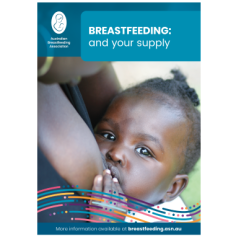Feeling overwhelmed by too much milk? Here’s how to help your supply settle down.

It’s common for your breasts to feel very full and leak a lot in the first weeks of breastfeeding. Some mums notice their milk comes too fast, or that their baby gets more milk than they need.
This can feel overwhelming, but it’s normal for your supply to take about 6 weeks to match your baby’s needs.
Tips to help your supply settle
Feed your baby according to need, rather than to a set schedule. It’s common for breastfed babies to feed 8 to 14 times or more in 24 hours.
Let your baby finish feeding from the first breast before offering the other. There’s no need to watch the clock. Just follow your baby’s lead.
Get to know your baby’s feeding cues, like turning their head, opening their mouth or sucking on their hands. When you spot these early signs, you can offer a feed before your breasts feel too full.
Try tips to manage your flow if it's too fast for your baby.
If your breasts feel uncomfortable and your baby is sleeping, it's okay to wake them for a feed.
Express just enough milk for comfort if needed, especially if your breasts are very full.
Avoid using a silicone milk catcher as it can remove more milk than needed, which adds to your large supply.
Check your baby is well attached to the breast.
Keep using tips to manage engorgement.
Don't give your baby formula or other fluids (including water) unless advised.
What if it doesn't settle?
For some mums, breast fullness, leaking, or fast milk flow can continue beyond the early weeks. If your breasts still feel very full, tight, or lumpy after about 6 weeks, you might have what’s called an ‘oversupply’ of milk.
You might notice some of these:
- Your breasts continue to fill quickly and often feel uncomfortable or lumpy.
- Your baby still can’t manage your fast milk flow.
- They may only need one breast at each feed.
- Your baby brings up milk at the end of feeds.
- They gain weight quickly.
- They might be extra fussy between feeds, especially in the evenings.
- Your baby has more than 5 heavy, wet nappies in 24 hours.
- Your baby still does a poo with every feed (or even more often), and it may be green, frothy, or explosive.
If you think you may have an oversupply, there are gentle ways to help manage your supply and make feeds more comfortable for you and your baby. Seeking support from a breastfeeding counsellor or health professional can help you find strategies that work for your situation.
© Australian Breastfeeding Association December 2025
Read more about too much milk
Evidence-led info and practical tips from our Breastfeeding Information Series
Breastfeeding: and your supply



